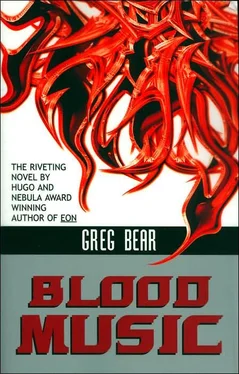Gregory Bear - Blood Music
Здесь есть возможность читать онлайн «Gregory Bear - Blood Music» весь текст электронной книги совершенно бесплатно (целиком полную версию без сокращений). В некоторых случаях можно слушать аудио, скачать через торрент в формате fb2 и присутствует краткое содержание. Город: New York, Год выпуска: 2005, ISBN: 2005, Издательство: ibooks, Incorporated, Жанр: Фантастика и фэнтези, на английском языке. Описание произведения, (предисловие) а так же отзывы посетителей доступны на портале библиотеки ЛибКат.
- Название:Blood Music
- Автор:
- Издательство:ibooks, Incorporated
- Жанр:
- Год:2005
- Город:New York
- ISBN:1596871067
- Рейтинг книги:4 / 5. Голосов: 1
-
Избранное:Добавить в избранное
- Отзывы:
-
Ваша оценка:
- 80
- 1
- 2
- 3
- 4
- 5
Blood Music: краткое содержание, описание и аннотация
Предлагаем к чтению аннотацию, описание, краткое содержание или предисловие (зависит от того, что написал сам автор книги «Blood Music»). Если вы не нашли необходимую информацию о книге — напишите в комментариях, мы постараемся отыскать её.
Blood Music — читать онлайн бесплатно полную книгу (весь текст) целиком
Ниже представлен текст книги, разбитый по страницам. Система сохранения места последней прочитанной страницы, позволяет с удобством читать онлайн бесплатно книгу «Blood Music», без необходимости каждый раз заново искать на чём Вы остановились. Поставьте закладку, и сможете в любой момент перейти на страницу, на которой закончили чтение.
Интервал:
Закладка:
Vergil lowered the syringe and looked off into nothing.
“Vergil?”
“I’ll be there,” he said tonelessly.
“Don’t get all excited,” Villar said peevishly. “We won’t hold the premiere for long.” He ducked out of the door. Vergil listened to his footsteps receding down the hall.
Rash, indeed. He reinserted the cannule through the cotton, squirted the serum back into the tube and dropped the syringe into a jar of alcohol. He replaced the tube in the rack and returned it to the Kelvinator. Before now, the spinner bottle and pallet of tubes had had no label but his name. He removed his name from the pallet and replaced it with, “Bio-chip protein samples; lab failures 21-32.” On the spinner bottle he placed a label reading, “Rat anti-goat lab failures 13-14.” No one would mess with an anonymous and unanalyzed group of lab failures. Failures were sacred.
He needed time to think.
Rothwild and ten of the key scientists on the MABs project had gathered around a large-screen projection TV in 233, an empty lab currently being used as a meeting room. Rothwild was a dapper red-haired fellow who acted as a controller and mediator between management and researchers. He stood beside the screen, resplendent in a cream-colored jacket and chocolate brown pants. Villar offered Vergil an avocado-green plastic chair and he sat at the rear of the room, legs crossed, hands behind his head.
Rothwild delivered the introduction. “This is the breakdown from Team Product E-64. You all contributed—” He glanced uncertainly at Vergil. “And now you can all share in the… uh, the triumph. I think we can safely call it that.”
“E-64 is a prototype investigatory biochip, three hundred micrometers in diameter, protein on a silicon substrate, sensitive to forty-seven different blood fraction variables.” He cleared his throat. They all knew that, but this was an occasion. “On May 10th, we inserted E-64 into a rat artery, closed the very small incision, and let it pass through the artery as far as it would go. The journey lasted five seconds. The rat was then sacrificed and the biochip recovered. Since that time, Terence’s group has ‘debriefed’ the biochip and interpreted the results. By putting the results through a special vector imaging program, we’ve been able to produce a little movie.”
He gestured to Ernesto, who pressed a button on the projector’s video recorder. Computer graphics flashed by—Genetron’s animated logo, stylized signatures from the imaging team, and then darkness. Ernesto switched off the room lights.
A pink circle appeared on the screen, expanded, and distorted into an irregular oval. More circles appeared within the first. “We’ve slowed the journey down six times,” Rothwild explained. “And to simplify things, we’ve eliminated the readouts on chemical concentrations in the rat blood.”
Vergil leaned forward in his chair, troubles momentarily forgotten. Streamers appeared and shot through the fluctuating tunnel of concentric circles.
“Blood flow through the artery,” Ernesto chimed in.
The journey down the rat artery lasted thirty seconds. Vergil’s arm-hair prickled. If his lymphocytes could see, this was what they would experience, traveling down a blood vessel… A long irregular tunnel, blood smoothly coursing, getting caught in little eddies, the artery constricting—smaller and smaller circles, jerks and nudges as the biochip bounced against the walls—and finally, the end of the journey, as the biochip wedged into a capillary.
The sequence ended with a flash of white.
The room filled with cheers.
“Now,” Rothwild said, smiling and raising his hand to return order. “Any comments, before we show this to Harrison and Yng?”
Vergil bowed out of the celebration after one glass of champagne and returned to his lab, feeling more depressed than ever. Where was his spirit of cooperation? Did he actually believe he could tackle something as ambitious as his lymphocytes, all by himself? So far, he had—but at the expense of having the experiment discontinued, perhaps even destroyed.
He slid the notebooks into a cardboard box and sealed the box with tape. On Hazel’s side of the lab, he found a masking tape label on a Dewar jar—”Overton, do not remove”—and peeled it off. He applied the label to his box and put the box in a neutral territory beside the sink. He then set about washing the glassware and tidying his side of the lab.
When the time came for an inspection, he would be the meek supplicant; he would give Harrison the satisfaction of victory.
And then, surreptitiously—over the next couple of weeks—he would smuggle out the materials he needed. The lymphocytes would be removed last; they could be kept for some time at his apartment, in the refrigerator. He could steal supplies to keep them viable, but he wouldn’t be able to do any more work on them.
He would decide later how he could best continue his experiment.
Harrison stood in the lab door.
“All clear,” Vergil said, properly repentant.
3
They watched him closely for the next week; then, concerned with the final stages of MABs prototype testing, they called off their watchdogs. His behavior had been beyond reproach.
Now he set about the last steps in his voluntary departure from Genetron.
Vergil hadn’t been the only one to step beyond the bounds of Genetron’s ideological largesse. Management, again in the person of Gerald T. Harrison, had come down on Hazel just last month. Hazel had gone off on a sidetrack with her E. coli cultures, trying to prove that sex had originated as a result of the invasion of an autonomous DNA sequence—a chemical parasite called the F-factor—in early prokaryotic life forms. She had postulated that sex was not evolutionarily useful—at least not to women, who could, in theory, breed parthenogenetically—and that ultimately men were superfluous.
She had gathered enough evidence for Vergil, peeping into her notebooks, to agree with her conclusions. But Hazel’s work did not meet the Genetron standards. It was revolutionary, socially controversial. Harrison had given the word; she had stopped that particular branch of research.
Genetron did not want publicity or even a tinge of controversy. Not yet. It needed a spotless reputation when it made its stock public and announced it was manufacturing functional MABs.
They had not been concerned with Hazel’s papers, however. They had allowed her to keep them. That Harrison had retained his file bothered Vergil.
When he was certain their guard was down, he went into action. He requested access to the company computers (he had been put on restriction indefinitely); quite properly, he said he needed to check his figures on structures of denatured and unfolded proteins. Permission was granted, and he logged onto the system in the share lab one evening after eight.
Vergil had grown up a little too early to be classified as an eighties whizkid, but in the last seven years he had revised his credit records at three major firms and made an entry into the records of a famous university. That entry had practically guaranteed his getting the Genetron position. Vergil had never felt guilty about these intrusions and manipulations.
His credit was never going to be as bad as it had once been, and there was no sense in being punished for past indiscretions. He knew he was fully capable of doing Genetron’s work—his fake university records were just a show for personnel directors who needed lights and music. Besides, Vergil had believed—until the past couple of weeks—that the world was his personal puzzle, and that any riddlings and unravelings he could perform, including computer hacking, were simply part of his nature.
Читать дальшеИнтервал:
Закладка:
Похожие книги на «Blood Music»
Представляем Вашему вниманию похожие книги на «Blood Music» списком для выбора. Мы отобрали схожую по названию и смыслу литературу в надежде предоставить читателям больше вариантов отыскать новые, интересные, ещё непрочитанные произведения.
Обсуждение, отзывы о книге «Blood Music» и просто собственные мнения читателей. Оставьте ваши комментарии, напишите, что Вы думаете о произведении, его смысле или главных героях. Укажите что конкретно понравилось, а что нет, и почему Вы так считаете.












